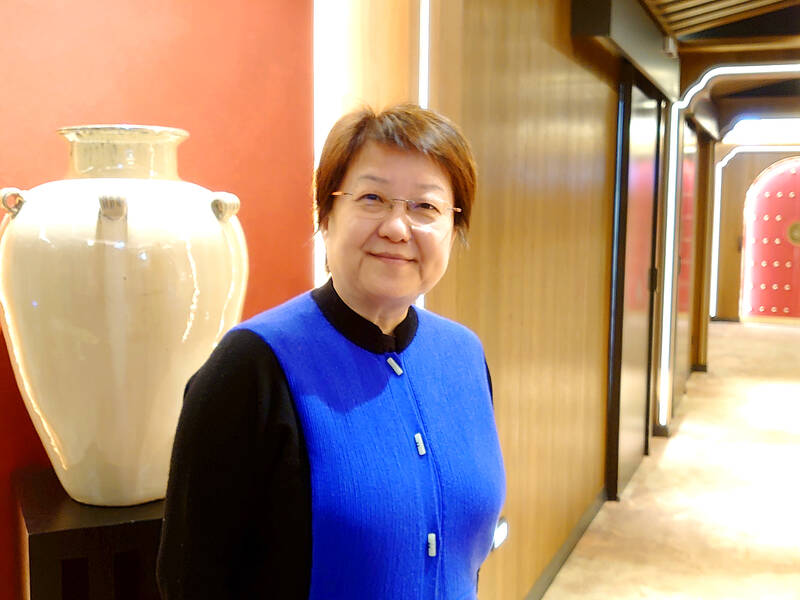Materials Analysis Technology Inc (MA-tek, 閎康) yesterday said revenue from Japan would double this year from last year, thanks to growing demand from Japanese state-backed chip venture Rapidus Corp.
MA-tek’s remarks came as Rapidus makes progress on its first chip manufacturing factory in Chitose, Hokkaido.
A pilot production of next-generation chips began yesterday, the Japanese company said.

Photo: CNA
Rapidus, founded in 2022, aims to ramp up production of 2-nanometer chips in 2027.
“We were told to work on the projects from this company [Rapidus] in June this year, ahead of the original schedule in 2026,” MA-tek chairwoman Hsieh Yong-fen (謝詠芬) told reporters in Taipei.
“Demand from Japan is really strong. We originally expected revenue from Japan to grow 40 percent. Now we are looking at a 100 percent increase,” Hsieh said.
As a result, MA-tek — which specializes in materials analysis, failure and reliability analyses for chipmakers and equipment vendors — expects Japan to contribute a bigger share, or about 15 percent of the company’s total revenue this year, compared with 10 percent last year, she said.
Taiwan and China accounted for 45 percent of revenue last year.
The growth momentum from Japan would help drive the company’s revenue this year to a record high from NT$5.11 billion last year, she added.
MA-tek operates three laboratories in Japan, including the latest one in Hokkaido, which focuses on providing material analysis for artificial intelligence (AI) chips.
The other two laboratories are in Kumamoto and Nagoya.
MA-tek introduced its most advanced analysis equipment, a Cs-corrected scanning transmission electron microscope, to provide advanced material analysis and failure analysis for contract chipmakers, and advanced chip packagers and testers, assisting customers in accelerating the mass production of 2-nanometer chips.
Numerous customers from Europe and the US including a US autonomous vehicle maker have shown interest in the machine, MA-tek said.
The scanning transmission electron microscope costs US$5 million, about three times higher than traditional equipment, given its ultra-high resolution and suitability for analyzing AI chips and vehicle chips, the company said.

‘SWASTICAR’: Tesla CEO Elon Musk’s close association with Donald Trump has prompted opponents to brand him a ‘Nazi’ and resulted in a dramatic drop in sales Demonstrators descended on Tesla Inc dealerships across the US, and in Europe and Canada on Saturday to protest company chief Elon Musk, who has amassed extraordinary power as a top adviser to US President Donald Trump. Waving signs with messages such as “Musk is stealing our money” and “Reclaim our country,” the protests largely took place peacefully following fiery episodes of vandalism on Tesla vehicles, dealerships and other facilities in recent weeks that US officials have denounced as terrorism. Hundreds rallied on Saturday outside the Tesla dealership in Manhattan. Some blasted Musk, the world’s richest man, while others demanded the shuttering of his

TIGHT-LIPPED: UMC said it had no merger plans at the moment, after Nikkei Asia reported that the firm and GlobalFoundries were considering restarting merger talks United Microelectronics Corp (UMC, 聯電), the world’s No. 4 contract chipmaker, yesterday launched a new US$5 billion 12-inch chip factory in Singapore as part of its latest effort to diversify its manufacturing footprint amid growing geopolitical risks. The new factory, adjacent to UMC’s existing Singapore fab in the Pasir Res Wafer Fab Park, is scheduled to enter volume production next year, utilizing mature 22-nanometer and 28-nanometer process technologies, UMC said in a statement. The company plans to invest US$5 billion during the first phase of the new fab, which would have an installed capacity of 30,000 12-inch wafers per month, it said. The

Taiwan’s official purchasing managers’ index (PMI) last month rose 0.2 percentage points to 54.2, in a second consecutive month of expansion, thanks to front-loading demand intended to avoid potential US tariff hikes, the Chung-Hua Institution for Economic Research (CIER, 中華經濟研究院) said yesterday. While short-term demand appeared robust, uncertainties rose due to US President Donald Trump’s unpredictable trade policy, CIER president Lien Hsien-ming (連賢明) told a news conference in Taipei. Taiwan’s economy this year would be characterized by high-level fluctuations and the volatility would be wilder than most expect, Lien said Demand for electronics, particularly semiconductors, continues to benefit from US technology giants’ effort

Minister of Finance Chuang Tsui-yun (莊翠雲) yesterday told lawmakers that she “would not speculate,” but a “response plan” has been prepared in case Taiwan is targeted by US President Donald Trump’s reciprocal tariffs, which are to be announced on Wednesday next week. The Trump administration, including US Secretary of the Treasury Scott Bessent, has said that much of the proposed reciprocal tariffs would focus on the 15 countries that have the highest trade surpluses with the US. Bessent has referred to those countries as the “dirty 15,” but has not named them. Last year, Taiwan’s US$73.9 billion trade surplus with the US